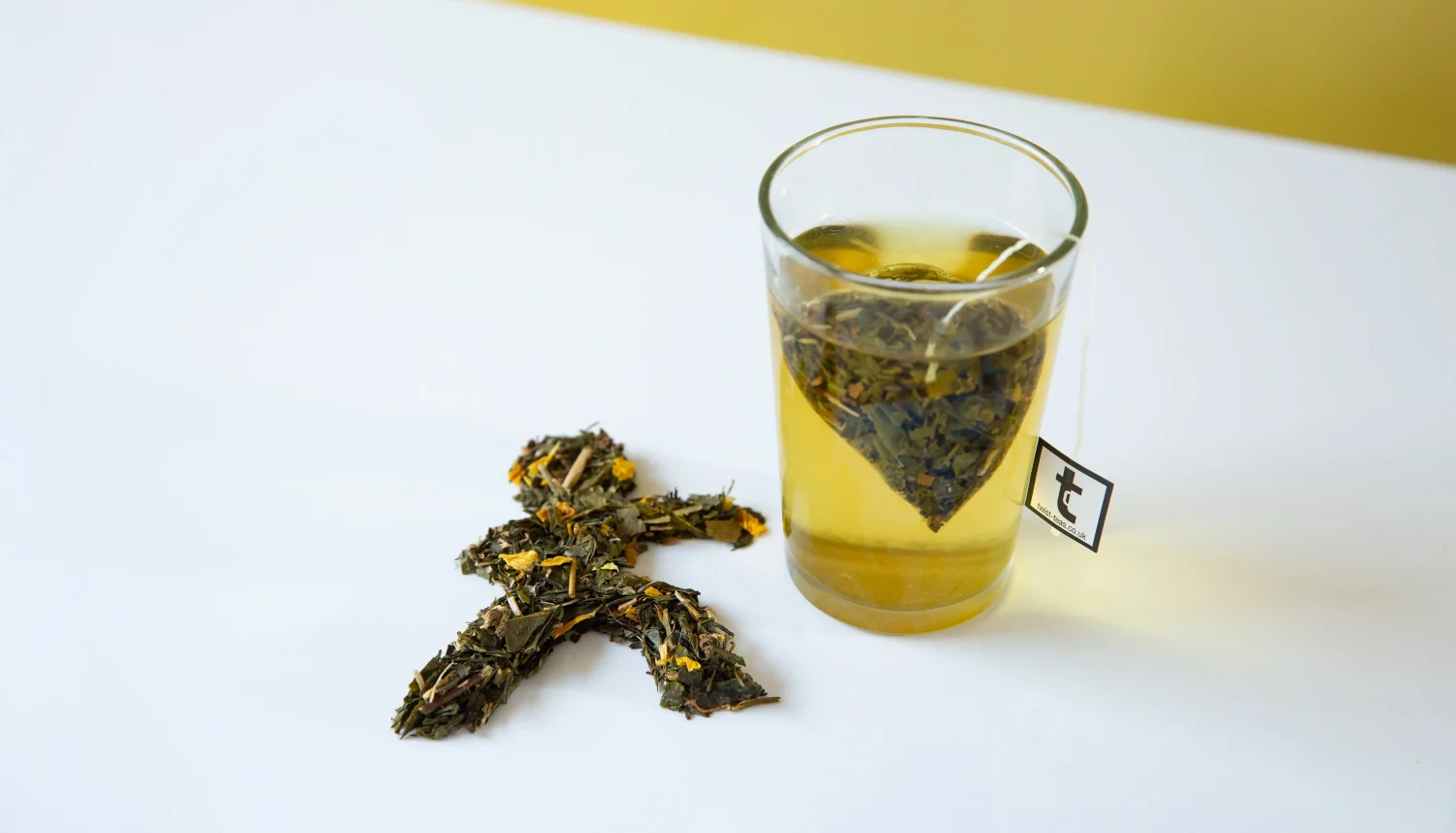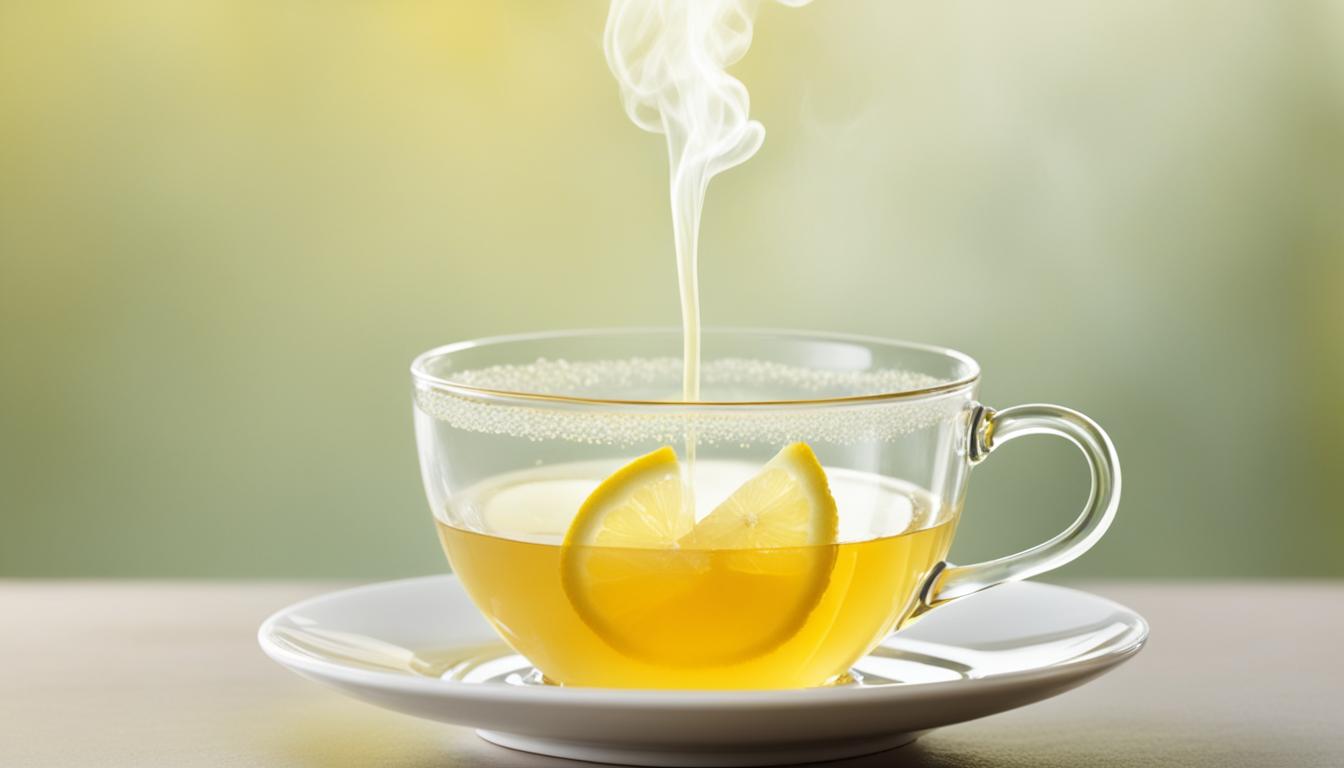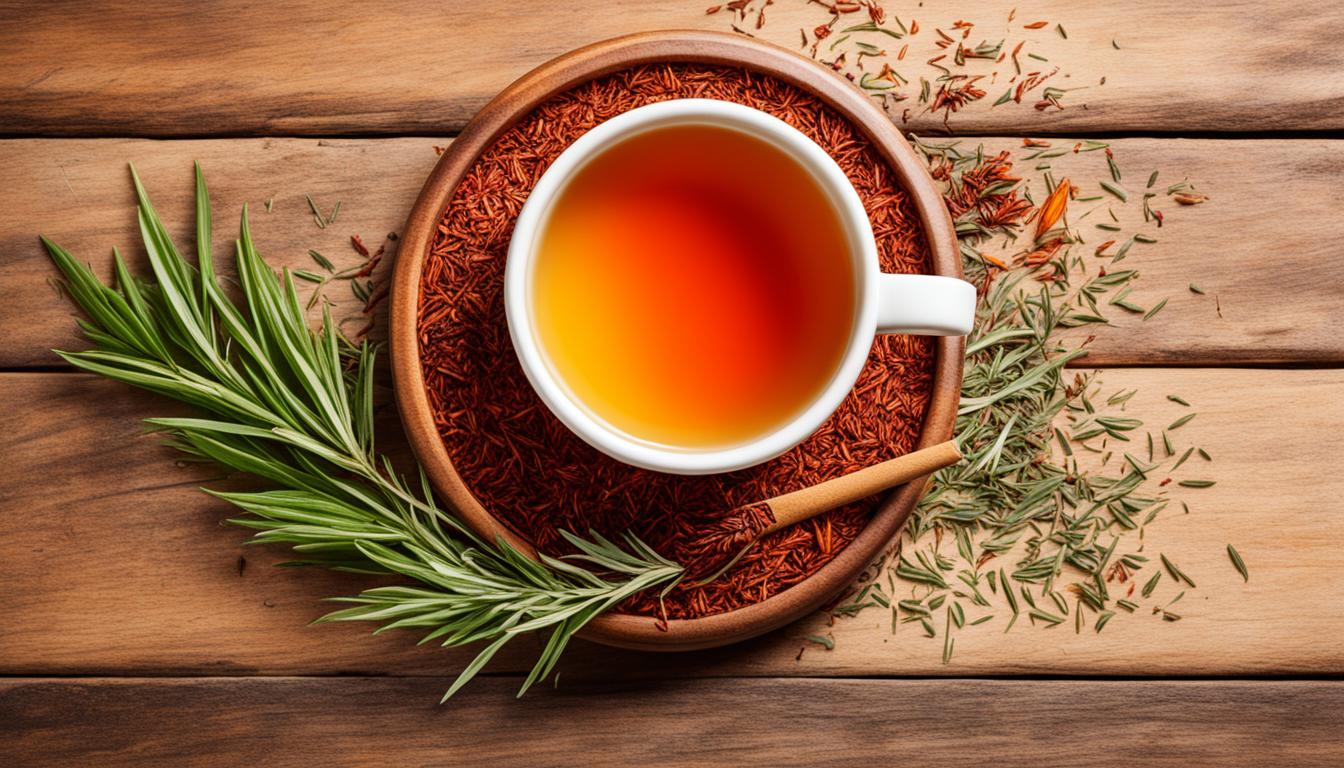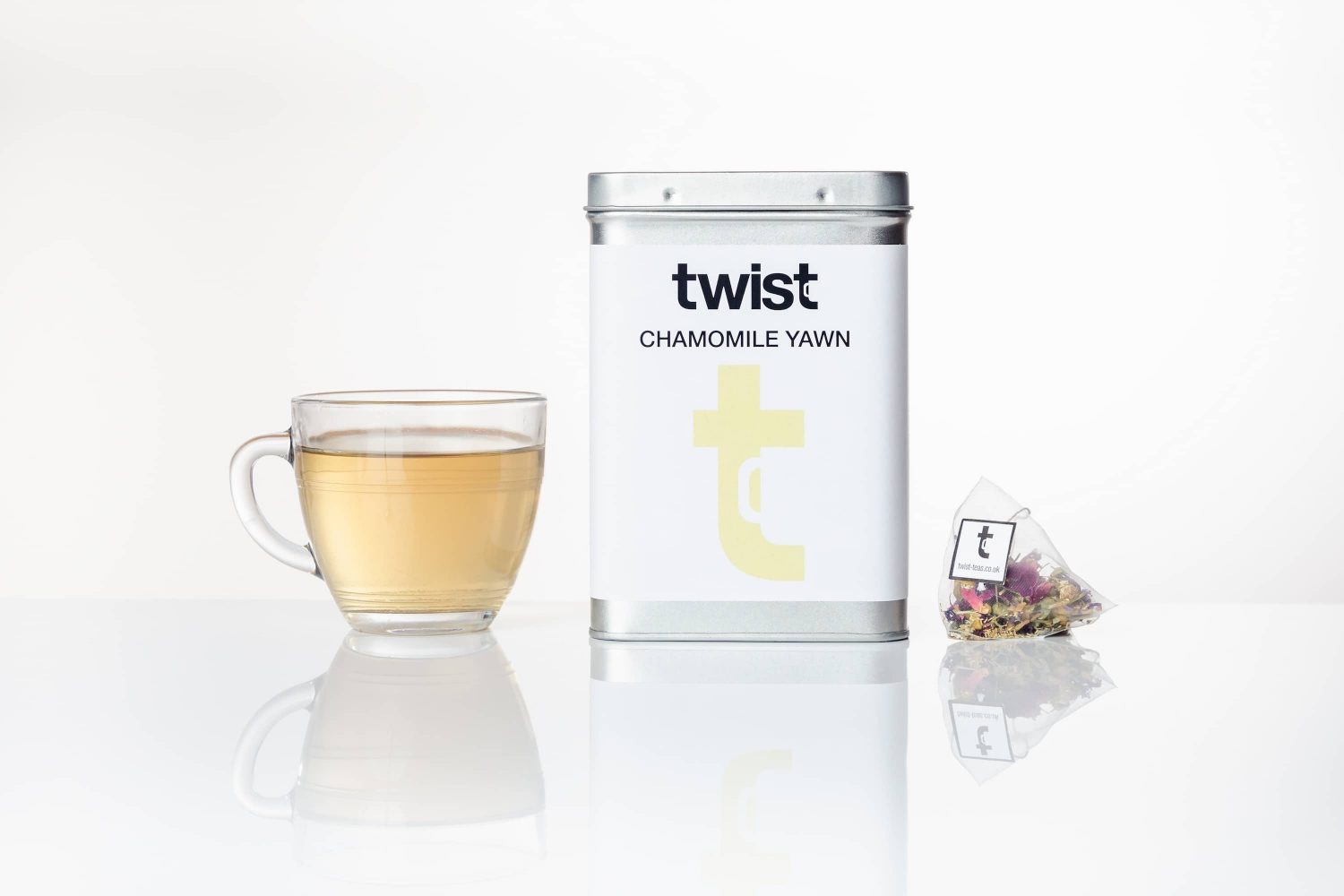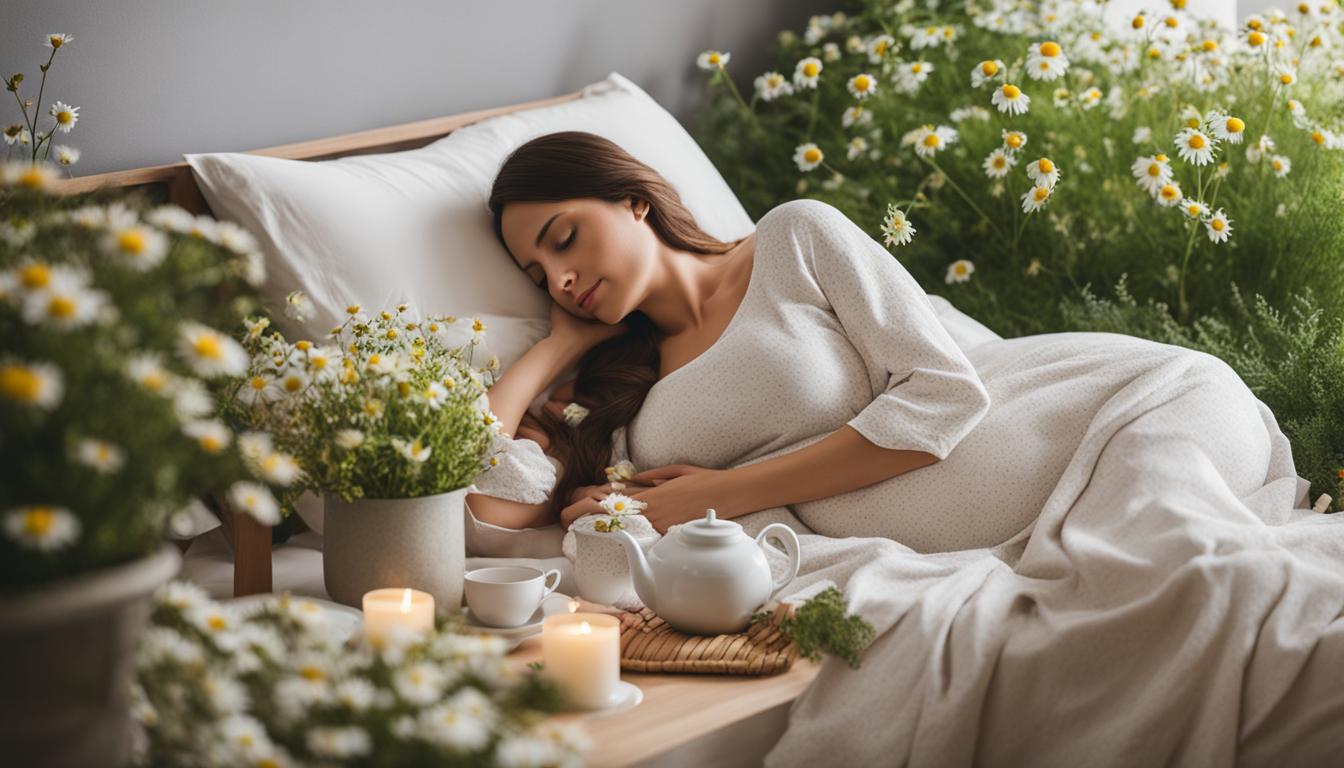News
As the days grow longer and the flowers begin to bloom, Mother’s Day approaches, reminding us of the incredible women who have shaped our lives. It’s a time to celebrate and honor the love, devotion, and sacrifices of our mothers. And what better way to show our appreciation than by indulging them in a delightful afternoon tea?
Imagine the scene: a table adorned with delicate china, fresh flowers, and an array of delectable treats. The soft clinking of teacups and the laughter shared between generations. This idyllic setting sets the scene for a truly memorable and heartwarming celebration with your mother.
Whether you’re an experienced host or a first-time entertainer, this guide is here to inspire and guide you in creating a Mother’s Day afternoon tea that will fill your mum’s heart with joy. From homemade recipes that will awaken her taste buds, to charming decorations that will set the perfect ambiance, we have gathered a range of ideas that will help you create a truly unforgettable experience for your mum.
So, gather your creativity and let’s embark on a journey to plan the perfect Mother’s Day afternoon tea that will make your mum feel cherished and loved. Together, let’s create memories that will last a lifetime.
Key Takeaways:
- Creating a delightful afternoon tea is a wonderful way to celebrate and honour your mum on Mother’s Day.
- A beautifully set table, homemade recipes, and charming decorations are essential elements for a memorable Mother’s Day afternoon tea.
- With this guide, you’ll find inspiration and ideas to create a unique and heartwarming experience for your mum.
- Show your love and appreciation by planning and hosting a Mother’s Day afternoon tea that will create lifelong memories.
- Let your creativity shine through as you embark on the journey of planning the perfect afternoon tea for your mum.
Homemade Afternoon Tea Recipes for Mother’s Day
If you’re looking to impress your mum with your culinary skills, look no further than these delightful homemade recipes for Mother’s Day afternoon tea. From classic favourites to unique creations, these recipes are sure to make her day extra special.
1. Classic Scones
“Scones are the quintessential treat for afternoon tea. Light and buttery, they pair perfectly with a cup of tea and lively conversation.”
No afternoon tea is complete without a batch of freshly baked scones. Serve them warm with clotted cream and jam for a traditional treat that will transport your mum to the English countryside. Here’s a simple recipe to get you started:
Ingredients:
- 225g self-raising flour
- Pinch of salt
- 55g unsalted butter, cold and cubed
- 25g caster sugar
- 150ml milk
- 1 tsp vanilla extract
- 1 egg, beaten (for glazing)
Method:
- Preheat your oven to 220°C/200°C fan/gas mark 7. Sift the flour and salt into a mixing bowl.
- Add the cubed butter to the bowl and rub it into the flour with your fingertips until the mixture resembles breadcrumbs.
- Stir in the caster sugar. Make a well in the center, then pour in the milk and vanilla extract. Mix everything together until you have a soft dough.
- Transfer the dough to a lightly floured surface and gently knead it until smooth. Roll out the dough to a thickness of about 2.5cm.
- Using a round cutter, cut out scones and place them on a baking tray lined with parchment paper. Brush the tops of the scones with beaten egg.
- Bake for 12-15 minutes until golden brown. Remove from the oven and transfer to a wire rack to cool.
Enjoy these warm, crumbly scones with your mum and a cup of tea for an authentic afternoon tea experience.
2. Finger Sandwiches
Finger sandwiches are a classic addition to any afternoon tea spread. These dainty delights are easy to make and offer a variety of flavours. Here are two popular variations to try:
“Delicate finger sandwiches are the perfect petite bites for an elegant afternoon tea. They add a touch of sophistication to the occasion.”
Ingredients for Cucumber Sandwich:
- 8 slices of white bread
- 1 cucumber, thinly sliced
- Butter
- Salt
Ingredients for Smoked Salmon Sandwich:
- 8 slices of wholemeal bread
- 150g smoked salmon
- Cream cheese
- Lemon juice
- Fresh dill
Method for Cucumber Sandwich:
- Spread butter on each slice of bread.
- Layer cucumber slices on half of the slices, then sprinkle with a pinch of salt.
- Top with the remaining slices of bread and press gently.
- Cut off the crusts and slice into small finger-sized sandwiches.
Method for Smoked Salmon Sandwich:
- Mix cream cheese with lemon juice and finely chopped dill. Season with salt and pepper to taste.
- Spread the cream cheese mixture on each slice of bread.
- Layer smoked salmon on half of the slices.
- Top with the remaining slices of bread and press gently.
- Cut off the crusts and slice into small finger-sized sandwiches.
Arrange these elegant sandwiches on a tiered stand for an eye-catching display.
3. Unique and Creative Treats
Put a twist on your Mother’s Day afternoon tea with these unique and creative treats:
“Adding a touch of innovation to your spread will surprise and delight your mum. These creative treats will make her feel extra special.”
Strawberry Shortcake Skewers:
Alternate fresh strawberries, bite-sized sponge cake cubes, and dollops of whipped cream on skewers. Serve these delightful skewers for a light and refreshing treat.
Rose Petal Macarons:
These delicate French macarons are infused with the subtle flavour of rose petals. Sandwiched together with a creamy filling, they are a delightful and dainty addition to your afternoon tea spread.
Lemon Lavender Bars:
Combine the bright flavours of lemon with the floral notes of lavender to create these zesty and aromatic bars. Their vibrant colours and refreshing taste are sure to impress.
These unique treats will add a touch of flair to your Mother’s Day afternoon tea.
| Recipe | Time | Servings |
|---|---|---|
| Classic Scones | 30 minutes | 12 scones |
| Finger Sandwiches | 15 minutes | 12 sandwiches |
| Strawberry Shortcake Skewers | 10 minutes | 12 skewers |
| Rose Petal Macarons | 2 hours 30 minutes | 24 macarons |
| Lemon Lavender Bars | 1 hour 30 minutes | 16 bars |
These homemade recipes are the perfect way to show your love and appreciation to your mum on Mother’s Day. Prepare them with care and enjoy a delightful afternoon tea celebration filled with love, laughter, and scrumptious treats.
Creating a Beautiful Mother’s Day Tea Party
When it comes to hosting a Mother’s Day tea party, creating a beautiful and inviting atmosphere is key. The right decorations, table settings, and ambiance can elevate your afternoon tea celebration and make it an unforgettable experience for your mum. Here are some ideas to help you add a special touch to your Mother’s Day tea party:
1. Elegant Table Settings
Set the stage for your Mother’s Day tea party by paying attention to the table settings. Opt for delicate floral china or vintage tea sets to add a touch of elegance. Consider using embroidered or lace tablecloths, and complement them with cloth napkins tied with ribbon or lace. Add a small posy of fresh flowers to each place setting for an additional charming detail.
2. Floral and Pastel Decorations
Embrace the essence of spring by incorporating floral and pastel decorations into your Mother’s Day tea party. Use fresh flowers in vases as centrepieces, or arrange them tastefully in teacups or teapots for a whimsical touch. You can also hang bunting or paper pom-poms in soft pastel shades to create a festive and celebratory atmosphere.
3. Delicate Tea Party Favours
Show appreciation to your guests by offering delicate tea party favours. Consider small gifts such as personalised tea bags, mini jars of homemade jam, or decorative tea infusers. Wrap them in pretty packaging and place them on each guest’s plate as a thoughtful gesture.
4. Soft Lighting and Music
Set a relaxing and intimate ambiance for your Mother’s Day tea party by using soft lighting and gentle music. Consider using tea light candles or string lights to create a warm and inviting atmosphere. Play soothing background music, such as classical or instrumental tunes, to enhance the overall experience.
5. Personalised Touches
Infuse your Mother’s Day tea party with personalised touches that reflect your mum’s taste and preferences. Display her favourite books or photographs on a small side table, or incorporate meaningful family heirlooms into the table decorations. These personalised touches will show your mum just how much thought and care you have put into the event.
6. Charismatic Centrepieces
Create eye-catching centrepieces that will be the focal point of your Mother’s Day tea party. Consider using tiered cake stands adorned with delicious treats, such as cupcakes or petit fours. Alternatively, create a fruit and flower arrangement in a decorative bowl or vase, adding colour and charm to the table.
By incorporating these ideas into your Mother’s Day tea party, you can create a beautiful and inviting atmosphere that is sure to impress your mum. The attention to detail and personalised touches will make her feel cherished and loved on her special day.
Crafting a Mother’s Day Afternoon Tea Menu
When it comes to planning a Mother’s Day afternoon tea, the menu plays a crucial role in creating a delightful and memorable experience. To help you make the most of this special occasion, we have curated a collection of sweet and savoury treats that will cater to different tastes and dietary preferences. Whether your mum has a sweet tooth or prefers something savoury, our menu suggestions will ensure a delightful spread that she will love.
Sandwiches and Savouries
Start your afternoon tea menu with a selection of delectable sandwiches and savouries. Here are a few ideas to inspire you:
- Smoked salmon and cream cheese finger sandwiches
- Cucumber and mint sandwiches
- Coronation chicken sandwiches
- Quiche Lorraine bites
Sweet Delights
No afternoon tea is complete without an array of sweet treats. Consider the following options to satisfy your mum’s sweet tooth:
- Classic scones with clotted cream and strawberry jam
- Mini Victoria sponge cakes
- Lemon drizzle cupcakes
- Chocolate eclairs
Refreshing Drinks
Complement your delicious spread with a selection of refreshing beverages. Here are a few ideas to quench your mum’s thirst:
- Traditional English breakfast tea
- Freshly brewed fruit-infused iced tea
- Sparkling elderflower mocktail
- Raspberry lemonade
A Beautiful and Delectable Spread
To make your Mother’s Day afternoon tea menu visually appealing, consider arranging your treats on a tiered cake stand, accompanied by beautiful floral arrangements. This will create an inviting and elegant atmosphere for your mum to enjoy.
“A successful afternoon tea menu strikes a balance between sweet and savoury, catering to different palates while showcasing an array of delightful flavours.”
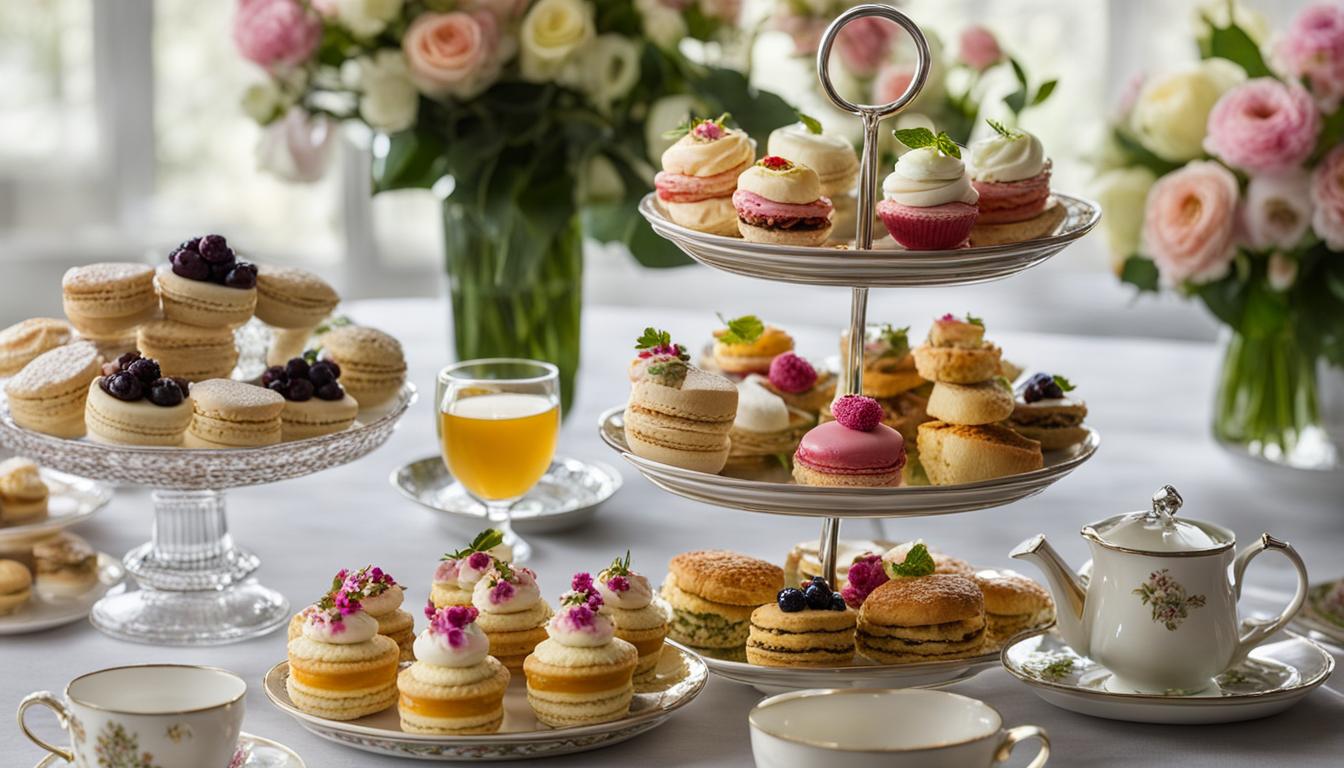
The table below summarises the suggested menu options for your Mother’s Day afternoon tea:
| Sandwiches and Savouries | Sweet Delights | Refreshing Drinks |
|---|---|---|
| Smoked salmon and cream cheese finger sandwiches | Classic scones with clotted cream and strawberry jam | Traditional English breakfast tea |
| Cucumber and mint sandwiches | Mini Victoria sponge cakes | Freshly brewed fruit-infused iced tea |
| Coronation chicken sandwiches | Lemon drizzle cupcakes | Sparkling elderflower mocktail |
| Quiche Lorraine bites | Chocolate eclairs | Raspberry lemonade |
Indulgent Treats for Mum at Afternoon Tea
In this section, we will tantalise your taste buds with a selection of indulgent treats that will make your mum feel extra special on Mother’s Day. These delectable delights will add a touch of luxury to your afternoon tea spread, ensuring a truly memorable experience for your mum.
What’s afternoon tea without a touch of chocolate? Treat your mum to a heavenly assortment of decadent chocolates that will melt in her mouth. From velvety truffles to rich dark chocolate pralines, these sweet treats will satisfy her cravings and leave her wanting more.
To complement the chocolates, why not include a variety of luxurious pastries? Delicate macarons in an array of flavours, such as raspberry and pistachio, are sure to impress. Miniature éclairs filled with luscious cream and topped with glossy chocolate ganache will add an elegant touch to your tea party. And don’t forget about the classic Victoria sponge cake, a quintessential British treat that your mum will love.
For those looking for a healthier option, you can’t go wrong with a selection of fresh fruit. Succulent strawberries dipped in rich Belgian chocolate provide the perfect balance between indulgence and freshness. Pair them with juicy slices of mango and ripe raspberries for a burst of natural sweetness that will delight your mother’s taste buds.
Not only will these indulgent treats satisfy your mum’s sweet tooth, but they will also create a visually stunning display. Opt for a tiered cake stand to showcase the assortment of chocolates and pastries, allowing your mum to choose her favourites. Add a touch of elegance with a beautiful floral centrepiece and dainty china teacups to complete the look.
“There is nothing like indulging in decadent treats to make your mum feel cherished on Mother’s Day.” – Carol Smith, Pastry Chef
Make your mother’s afternoon tea extra special with these indulgent treats. Whether she has a sweet tooth or prefers something lighter, there’s something for every mother to enjoy. Show your love and appreciation by creating an afternoon tea spread that she will remember for years to come.
Easy Mother’s Day Afternoon Tea Ideas
If you want to host a stress-free Mother’s Day afternoon tea that still delights your mum, you’re in the right place. In this section, we’ve curated simple yet delightful ideas that will help you create a memorable experience without spending hours in the kitchen.
1. Mini Sandwiches with a Twist
Add a touch of creativity to your afternoon tea menu by serving mini sandwiches with unique fillings. Think cucumber and cream cheese with dill, smoked salmon with lemon and dill mayo, or coronation chicken with mango chutney. These bite-sized treats are not only delicious but also visually appealing, making them perfect for a special occasion like Mother’s Day.
2. Scones with a Selection of Spreads
No afternoon tea is complete without scones. Bake a batch of fresh, homemade scones and serve them with a selection of spreads. Offer classic options like clotted cream and strawberry jam, as well as more unconventional choices like lemon curd or Nutella. Your mum will appreciate the variety and the opportunity to customise her scone to her liking.
3. Fruit-Infused Water
Instead of serving plain water, elevate your Mother’s Day afternoon tea experience by offering fruit-infused water. Simply add slices of fresh fruit, such as strawberries, oranges, or cucumbers, to a pitcher of water and let it infuse for a refreshing and flavourful drink. Not only does this add a touch of elegance to your table, but it also encourages hydration.
4. Mini Desserts
Impress your mum with a selection of mini desserts that she can indulge in without feeling overwhelmed. Serve bite-sized cakes, tarts, and pastries that offer a variety of flavours and textures. Think mini lemon meringue pies, chocolate-covered strawberries, or raspberry macarons. These petite treats are the perfect sweet ending to your Mother’s Day afternoon tea.
5. Personalised Tea Favours
Add a personal touch to your Mother’s Day afternoon tea by gifting each guest with a personalised tea favour. Prepare small sachets of loose leaf tea or herbal tea blends, and attach a heartfelt note or a customised label with your mum’s name. This thoughtful gesture shows your appreciation and leaves a lasting impression.
6. Relaxing Atmosphere
Creating a relaxing atmosphere is just as important as the food when hosting a Mother’s Day afternoon tea. Choose soft, soothing music to play in the background and light scented candles to create a tranquil ambiance. Decorate the table with fresh flowers and elegant tableware to set the mood for an enjoyable and memorable tea party.
By incorporating these easy ideas into your Mother’s Day afternoon tea, you can create a stress-free yet delightful event that will make your mum feel loved and appreciated. Enjoy your special celebration!
Traditional Mother’s Day Afternoon Tea Delights
Indulge in the timeless charm of a traditional Mother’s Day afternoon tea experience. From classic tea blends to delectable treats, this delightful celebration will surely make your mum feel cherished.
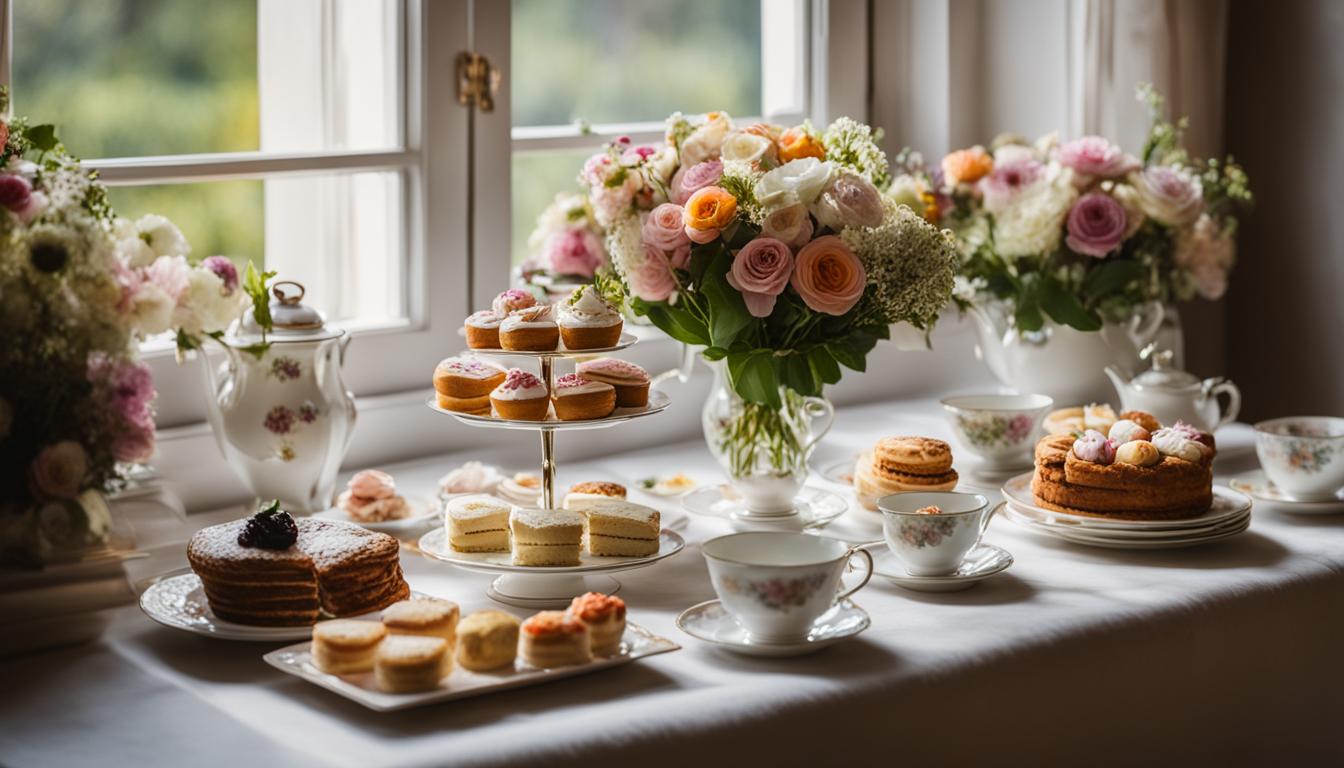
At the heart of a traditional Mother’s Day afternoon tea is a selection of exquisite tea blends. From the delicate and floral notes of Earl Grey to the robust and comforting flavours of English Breakfast, the tea will set the tone for an elegant and relaxing gathering.
Pair the fragrant tea with an array of scrumptious treats. Freshly baked scones, served with clotted cream and strawberry jam, are a quintessential part of any traditional afternoon tea. The warm, buttery scones will melt in your mouth, creating a heavenly experience for your taste buds.
“The tradition of afternoon tea brings people together to celebrate and appreciate the simple pleasures of life. It’s a time to slow down, savour the moment, and show love and gratitude to the most important person in our lives – our mothers.” – Gemma, Tea Lover
Indulge in dainty finger sandwiches filled with classic combinations like cucumber and cream cheese or smoked salmon and dill. These bite-sized delights offer a savoury balance to the sweet treats and add an exquisite touch to the afternoon tea experience.
To satisfy the sweet tooth, a variety of delicate pastries and cakes will be the highlight of the table. From fluffy Victoria sponge cakes to elegant French macarons, these treats are not only visually stunning but also irresistibly delicious.
A Traditional Mother’s Day Afternoon Tea Menu:
| Treats | Description |
|---|---|
| Freshly baked scones | Warm scones served with clotted cream and strawberry jam |
| Finger sandwiches | Cucumber and cream cheese, smoked salmon and dill |
| Victoria sponge cakes | A classic sponge cake layered with strawberry jam and cream |
| French macarons | Delicate almond meringue cookies with a variety of fillings |
| Assorted tea blend | Earl Grey, English Breakfast, and other fragrant blends |
Add a touch of elegance to the table with beautiful vintage china, delicate lace tablecloths, and fresh flowers. The ambiance created by these traditional elements will transport your mother back to an era of grace and sophistication.
As you gather with your loved ones around the table, engage in heartfelt conversations, and create lasting memories, the traditional Mother’s Day afternoon tea experience will become a cherished tradition for years to come.
Unique Mother’s Day Afternoon Tea Ideas
Make your Mother’s Day afternoon tea truly one-of-a-kind with these creative and unique ideas. From captivating themed decorations to innovative recipes, you can elevate your celebration and create lasting memories for your mum.
Themed Decorations
Transport your mum to a whimsical wonderland with themed decorations that reflect her interests and personality. Consider hosting a floral-inspired tea party, complete with vibrant blooms, delicate china, and garden-inspired centrepieces. Alternatively, you could create an elegant vintage atmosphere with lace doilies, antique teacups, and a touch of nostalgia.
Innovative Recipes
Add a delightful twist to your traditional Mother’s Day afternoon tea menu with innovative recipes that push the boundaries of flavour. Impress your mum with unique tea-infused treats like Earl Grey macarons or matcha-flavoured scones. For a savoury option, experiment with out-of-the-box sandwich fillings like brie and cranberry or smoked salmon and avocado.
| Themed Decorations | Innovative Recipes |
|---|---|
| Floral-inspired tea party | Earl Grey macarons |
| Vintage atmosphere | Matcha-flavoured scones |
| Brie and cranberry sandwiches | |
| Smoked salmon and avocado sandwiches |
A table showcasing thematic decorations and innovative recipe ideas for a unique Mother’s Day afternoon tea.
Interactive Tea Stations
Add an element of fun and interactivity to your Mother’s Day afternoon tea with themed tea stations. Set up a DIY tea blending station where your mum can mix her own personalised tea blend using an assortment of loose leaf teas, herbs, and dried flowers. Alternatively, create a make-your-own tea sandwich bar with a variety of breads, fillings, and toppings for guests to assemble their own delectable creations.
Thoughtful Table Favours
Show your appreciation for your mum and guests with thoughtful table favours that they can take home as keepsakes. Consider creating custom tea blends packaged in beautifully labeled jars, or hand out mini succulents as a symbol of love and growth. These tokens of appreciation will add a personal touch to your Mother’s Day afternoon tea and leave a lasting impression.
Host a Mother’s Day afternoon tea that reflects your mum’s unique personality, with themed decorations, innovative recipes, interactive tea stations, and thoughtful table favours.
An image showcasing a beautifully set table for a unique Mother’s Day afternoon tea.
Bringing It All Together: Planning Your Mother’s Day Afternoon Tea
When it comes to celebrating Mother’s Day, nothing quite compares to the elegance and charm of an afternoon tea. Planning this special event requires attention to detail and thoughtful consideration to ensure a seamless and enjoyable experience for your mum. In this section, we will provide practical tips and advice on how to plan and organise your Mother’s Day afternoon tea, from creating a timeline to setting the ambiance.
Creating a Timeline
Start by creating a timeline to help you stay organised and ensure everything runs smoothly on the day of the tea. Consider the following:
- Invitations: Send out invitations at least two weeks in advance to give guests enough time to RSVP.
- Menu Planning: Decide on the menu and make a grocery list. Prepare any make-ahead dishes a day or two before the event.
- Setting the Table: Set the table the night before the tea, laying out the china, silverware, and linen.
- Preparing the Tea: Brew the tea just before the guests arrive to ensure it stays fresh and flavourful.
- Arranging the Food: Prepare and arrange the food on platters or tiered stands just before serving.
Setting the Ambiance
The ambiance of your Mother’s Day afternoon tea can enhance the overall experience for your mum and guests. Consider these tips:
- Decorations: Create a warm and inviting atmosphere with floral arrangements, delicate tablecloths, and elegant centrepieces.
- Music: Select soft and soothing background music to create a relaxing ambience as guests enjoy their tea.
- Seating: Arrange comfortable seating for your guests, ensuring there is enough space for everyone to feel relaxed and at ease.
- Personal Touches: Include personal touches that reflect your mum’s preferences or interests, such as her favourite flowers or sentimental decorations.
By creating a well-planned timeline and setting the perfect ambiance, you’ll be able to host a Mother’s Day afternoon tea that your mum will cherish. Keep these tips in mind as you bring all the elements together for a delightful and memorable celebration.
“A successful Mother’s Day afternoon tea is not just about the delicious food and beautiful table settings. It’s about creating a memorable experience that shows your mum just how much she means to you.” – Unknown
Conclusion
In conclusion, these delightful Mother’s Day afternoon tea ideas and recipes will help you create a memorable and special experience for your mum. From homemade treats to stylish decorations, you can show your love and appreciation on her special day.
By hosting a beautiful and delightful Mother’s Day afternoon tea celebration, you can create a warm and inviting atmosphere where your mum will feel loved and cherished. The homemade recipes will impress her with your culinary skills and the charming decorations will add a personal touch to the event. Why not take a look at our special Mother’s Day blend ‘To Mother With Love Tea,’ to pair with your delicious homemade treats?
Take this opportunity to express your gratitude and let your mum know how much she means to you. A Mother’s Day afternoon tea is the perfect way to spend quality time together and create lifelong memories. So gather your ingredients, set the table, and enjoy a delightful afternoon tea with your mum.
FAQ
Are the recipes in the Homemade Afternoon Tea Recipes for Mother’s Day section suitable for beginners?
Yes, the recipes in this section are designed to be beginner-friendly, with step-by-step instructions and common ingredients.
How can I make the Mother’s Day tea party decorations more personalised?
You can personalise the decorations by incorporating your mum’s favourite colours, adding photos of her, or creating customised table settings with personalised name cards or napkins.
Can I adapt the Mother’s Day afternoon tea menu for dietary restrictions?
Absolutely! The menu suggestions provided in this section can be adapted to cater to different dietary restrictions. For example, you can offer gluten-free sandwiches or vegan desserts.
Can you suggest some indulgent treats for my mum without requiring advanced baking skills?
Absolutely! In the Indulgent Treats for Mum at Afternoon Tea section, we have included recipes for easy-to-make yet luxurious treats like chocolate-dipped strawberries, homemade truffles, and mini cheesecakes.
What are some easy Mother’s Day afternoon tea ideas for those with limited time?
In the Easy Mother’s Day Afternoon Tea Ideas section, we have included suggestions such as purchasing pre-made pastries, using store-bought scones, and utilising ready-to-serve tea blends to save time.
Are there any vegetarian options in the Traditional Mother’s Day Afternoon Tea Delights section?
Yes, we have included vegetarian options throughout the Traditional Mother’s Day Afternoon Tea Delights section, such as cucumber sandwiches and vegetarian quiches.
How can I make my Mother’s Day afternoon tea truly unique and memorable?
In the Unique Mother’s Day Afternoon Tea Ideas section, we have included suggestions like hosting a themed tea party, creating signature cocktails, and incorporating interactive elements like a DIY dessert station.
What tips can you offer for seamless planning and organising of a Mother’s Day afternoon tea?
In the Bringing It All Together: Planning Your Mother’s Day Afternoon Tea section, we provide practical tips such as creating a checklist, preparing in advance, and delegating tasks to ensure a smooth and enjoyable celebration.

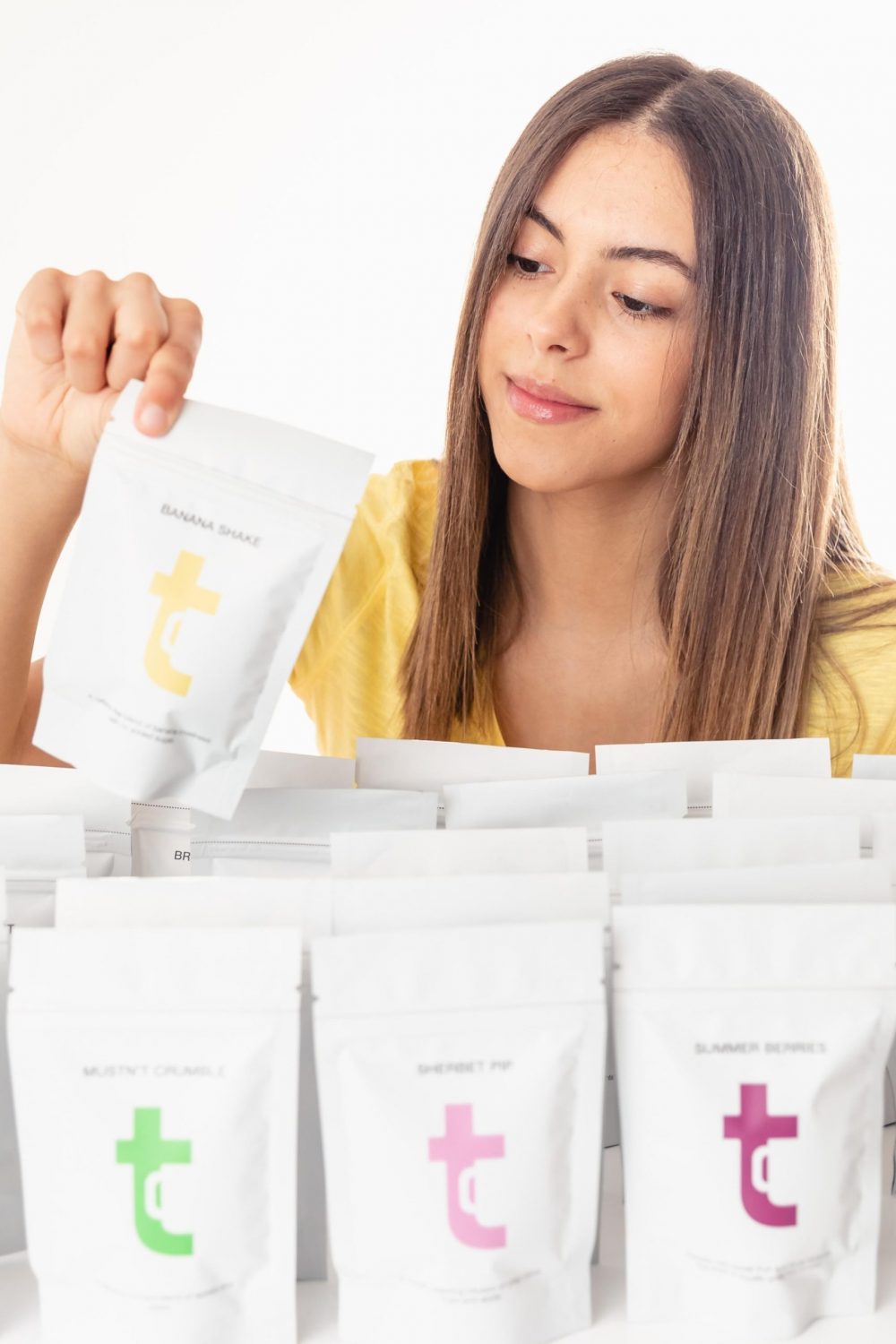
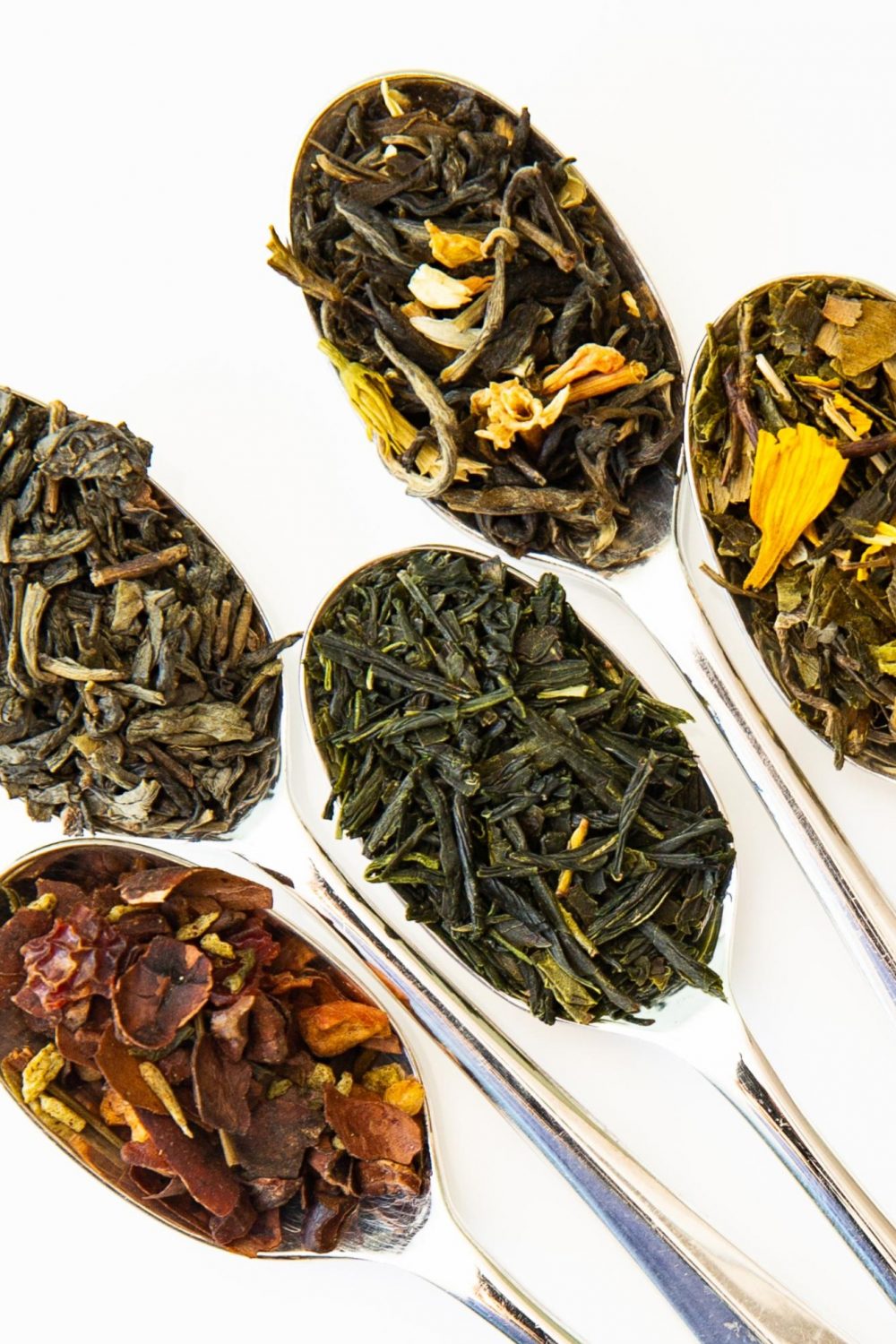
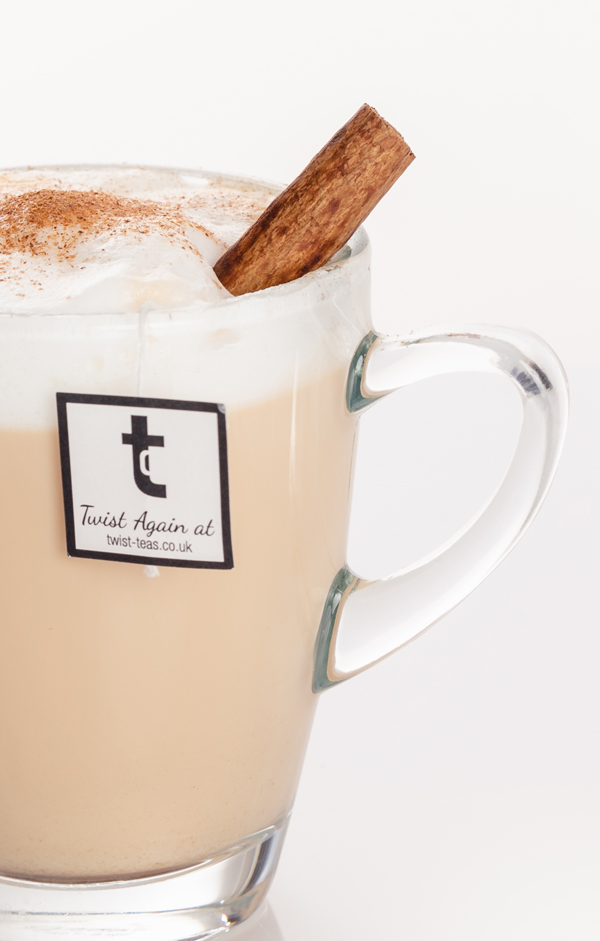


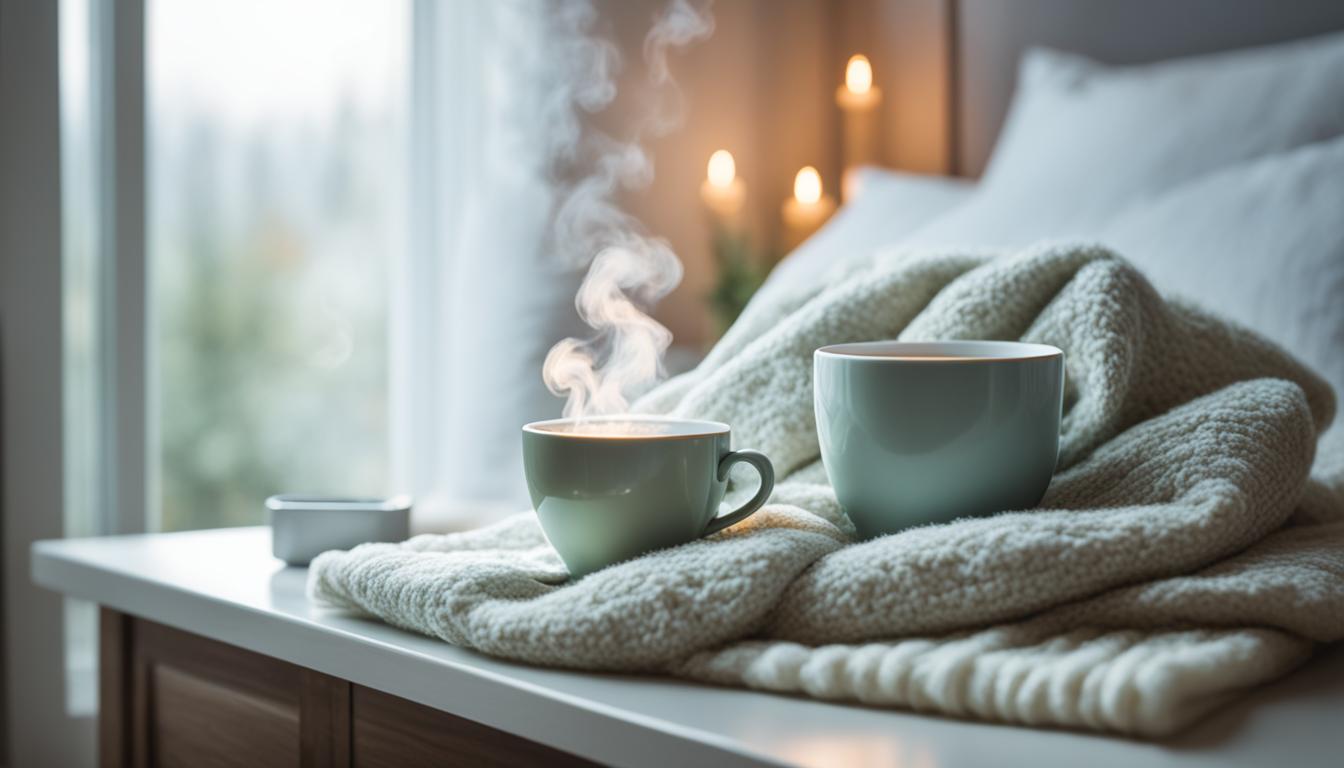
 Here’s a basic recipe for homemade sleep tea:
Here’s a basic recipe for homemade sleep tea:
